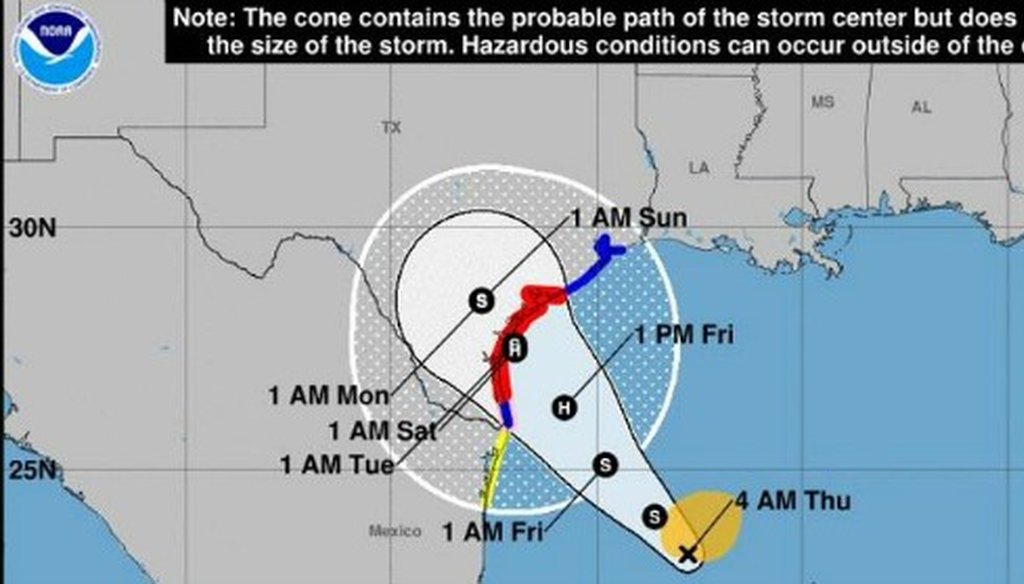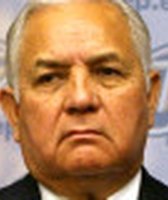Stand up for the facts!
Our only agenda is to publish the truth so you can be an informed participant in democracy.
We need your help.
I would like to contribute

Here's how the federal government was forecasting Hurricane Harvey's path as of the morning of Aug. 24, 2017 (screen shot of Austin American-Statesman website, www.statesman.com).
As far back as 2008, the PolitiFact Truth-O-Meter gauged a hurricane claim.
That’s when Sen. John McCain, the Arizona Republican challenging Democrat Barack Obama for president, said his support for offshore oil drilling made sense.
"I would remind you that off the coast of Louisiana and Texas, they both had hurricanes that did not cause any real difficulties," McCain said, Hurricanes Katrina and Rita, which hit the coasts of Louisiana and Texas within weeks of each other in 2005. "So the environmental side of it I think is pretty well okay."
PolitiFact in Washington concluded that safety valves under the ocean floor intended to prevent spills even if an oil rig is damaged worked as they were supposed to during Katrina and Rita. (Keep in mind this analysis posted before the April 2010 BP oil spill.)
But it was a stretch to say the storms caused "no real difficulties."
Without question, spills had occurred offshore in the wake of Katrina and Rita. Studies commissioned by the Minerals Management Service, a division of the U.S. Interior Department, concluded that a total of just over 741,000 gallons of oil spilled due to Hurricanes Katrina and Rita on the outer continental shelf, the technical term for the area offshore.
"We have not said that there were no spills," said David Smith, deputy chief of public affairs for MMS. "We've said that there are no reports of oil from federal waters reaching shore or causing environmental damage."
Another MMS study looked at offshore oil platforms. It noted that the hurricanes crossed the path of about 3,000 offshore platforms, destroying 117 platforms that either became unmoored or fell into the sea.
PolitiFact rated McCain’s claim Half True.
In 2010, a group claimed that Gov. Rick Perry had shifted hurricane aid from its intended beneficiaries to help rebuild the Governor’s Mansion.
Back to Basics said in its ad that:Perry is "taking money away from hurricane victims" and diverting it to "remodel the Governor's Mansion," which had been heavily damaged in a 2008 arson fire.
"Here's what he did," the ad’s narrator said. "After begging for federal hurricane aid, Perry is taking millions of it to remodel the Governor's Mansion so he can move in faster. Diverting disaster funds for himself."
Not so fast, we concluded before rating this claim False.
The PolitiFact Texas analysis: Whether the FEMA reimbursements to Texas amount to federal aid or not, the group’s statement that Perry was "taking money away from hurricane victims" and diverting it to the mansion project is wrong on two fronts. First, FEMA set aside the money to cover agency costs already incurred in response to the hurricane; no victims were bereft as a result, best we could tell. Secondly, the assignment of the funds to the mansion work was made by state lawmakers; Perry didn't earmark any money alone.
In 2011, Perry described the state’s so-called rainy day fund as "our insurance policy against a major natural disaster." Suggesting lawmakers shouldn’t tap the fund unless vitally necessary, Perry said in a conference call: "One of the things that I remind people, in why it is so important to protect that (fund) is... it is our insurance policy against a major natural disaster" such as a huge hurricane barreling up the Houston Ship Channel. "And for Texas to be caught in a situation where (it) did not have a substantial buffer in that (fund), it could be catastrophic" to the economy, he said.
We looked at if the fund, in place since 1988, adds up to the state’s insurance policy against a major natural disaster. Its purposes proved to be broader. Billy Hamilton, a former deputy state comptroller, then told KUT News the Economic Stabilization Fund, based on banking some state oil and gas tax revenue, was formulated by legislators and approved by voters to "protect ourselves from future economic shocks."
We rated Perry’s claim Mostly False, noting a provision in the constitutional amendment giving lawmakers sweeping authority, with a two-thirds’ votes of the members present in each body, to "appropriate amounts from the economic stabilization fund at any time and for any purpose."
In 2016, our colleagues at PunditFact rated Pants on Fire conservative commentator Rush Limbaugh’s claim that "11 straight years of no major hurricanes striking land" in the United States "bores a hole right through the whole climate change argument."
It doesn’t. Among flaws: Looking only at major hurricanes that hit the United States ignores storm activity around the world. Second, storm frequency doesn’t strictly correlate with rising temperature. Third, many other data points prove climate change is real.
In 2013, New Jersey Gov. Chris Christie framed a case for aid to his state in the wake of SuperStorm Sandy by telling David Letterman that in the wake of Hurricane Katrina, federal solons "approved $60 billion" in aid "within 10 days of the storm on a voice vote."
PolitiFact New Jersey rated Christie’s recap Half True.
All the described funding wasn’t approved by federal officials shouting "yea" or "nay" on the House and Senate floors. Still, Congress signed off on $10.5 billion in Katrina aid without recorded votes--with the remaining $51.8 billion approved by recorded votes.
But Christie’s point was valid. While Hurricane Sandy victims waited three months for federal aid to be approved, Congress had authorized $62.3 billion in the 10 days after Hurricane Katrina made landfall in Louisiana.
In 2014, PunditFact found Mostly True a claim by MSNBC commentator Lawrence O’Donnell that Gov. Christie "helped funnel $6 million in federal Hurricane Sandy money to a senior center in Belleville, N.J., a place that suffered no damage."
Christie did help steer $6 million in Superstorm Sandy-relief money to a senior center and Belleville fared much better than other places in New Jersey.
But to say "no damage" was an exaggeration. Most if not all of New Jersey felt something, even if it wasn’t as severely pummeled as the Jersey Shore. All 21 counties were declared major disaster areas. A Rutgers University study found that Belleville ranked 255th out of 553 municipalities in what researchers called the Sandy Community Hardship Index. The index measures the residential, commercial and municipal damage to each New Jersey town -- with No. 1 being the hardest hit.
Write us here about claims that make you wonder about accuracy.
Our Sources
Truth-O-Meter article, PolitiFact, "Disaster, no. Difficulties, yes," July 25, 2008
Truth-O-Meter articles, PolitiFact Texas, "Back to Basics group says Rick Perry is diverting hurricane aid to remodel the Governor's Mansion," Oct. 27, 2010; "Rick Perry says rainy day fund is 'our insurance policy against a major natural disaster,'" March 18, 2011
Truth-O-Meter articles, PunditFact, "Lawrence O'Donnell says Chris Christie steered $6 million in Sandy funds to New Jersey area that had 'no damage' from storm," Feb. 19, 2014; "Rush Limbaugh wrong that lack of hurricanes diminishes climate change argument," Oct. 7, 2016
Truth-O-Meter article, PolitiFact New Jersey, "Chris Christie tells David Letterman that $60 billion in Katrina aid was approved 'on a voice vote,'" Feb. 6, 2013







































